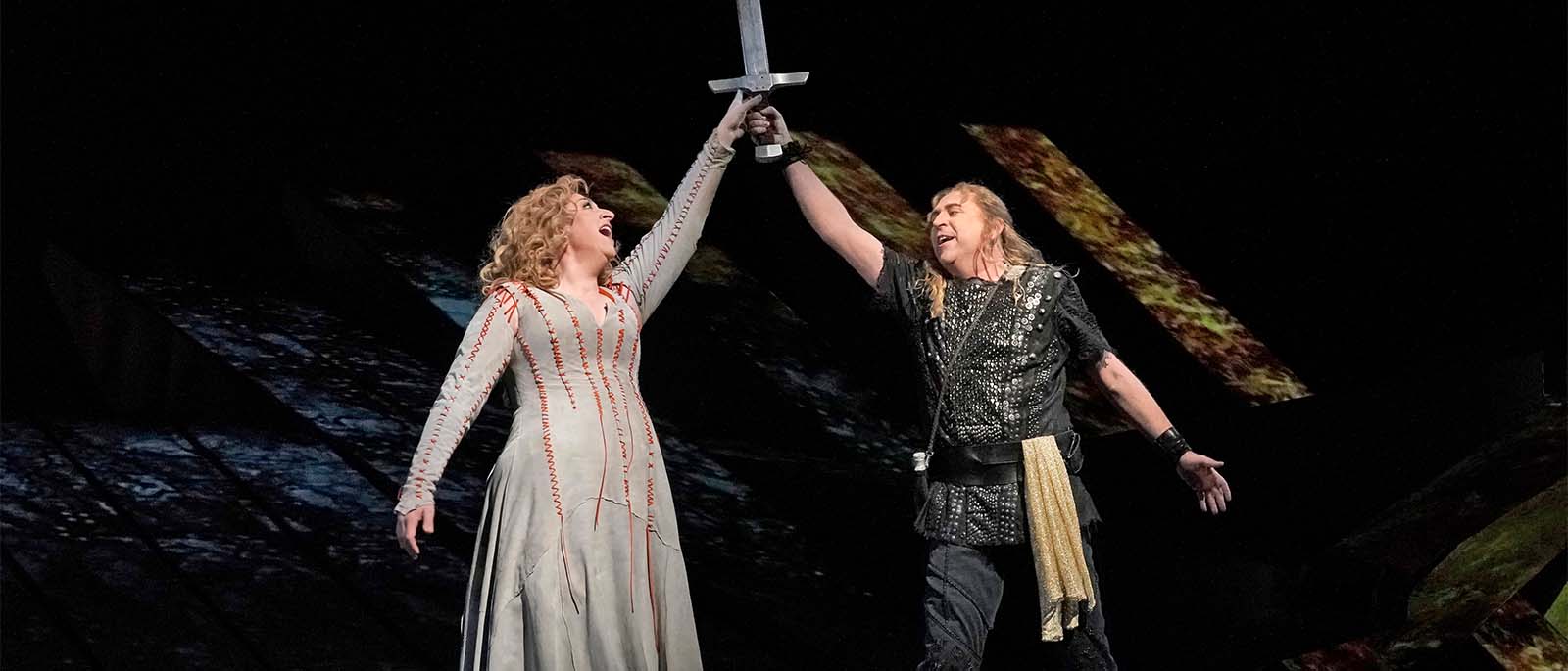
Hero of Our Time
Andreas Schager’s astonishing company debut as Siegfried in the Met’s 2019 Ring cycle (pictured above) introduced New York to one of the world’s leading Heldentenors. Now, he makes his much-anticipated return to the Met in the title role of Wagner’s medieval drama Tannhäuser. By Jonathan Minnick
It has been a long journey for Andreas Schager from milking cows on his parents’ farm in rural Austria to taking the stages of the world’s most prominent opera houses in some of the repertory’s most vocally demanding roles. It began with singing in church choirs, which kindled a passion for music that eventually led him to conservatory training in Vienna, followed by a professional career that, amazingly, started with a decade spent singing largely operetta. Only then did Schager make a dramatic change to singing Wagner, a seemingly impossible leap from the much lighter Viennese specialty. “After operetta, I went straight to Wagner. There was nothing in between,” he says. “And when you start with Wagner, and you succeed with Wagner, you’ll never stop singing Wagner.”
In the years since his first performance in one of the composer’s operas, as the lighter-voiced David in Die Meistersinger von Nürnberg, in 2009, Schager went on to conquer all the peaks in the Wagnerian tenor repertoire, making waves in Paris, London, Berlin, Vienna, Bayreuth, and many other major houses along the way. To Schager, the transition wasn’t as outlandish as it seems. “Siegfried is exactly as much singing as a double performance of Barinkay in Johann Strauss, II’s Der Zigeunerbaron, and with a similar tessitura,” he says. By 2019, his star had fully risen, with The New York Times profiling him and testifying that “in endurance-test parts like Siegfried, Tannhäuser, Parsifal, and Tristan, his full, ringing voice seems indefatigable. He can channel a character’s wild desperation, ardor, or impetuousness with steely yet easygoing assurance.”
When Schager finally arrived at the Met for his debut that year, the story remained the same—and those who were fortunate enough to experience his few appearances as Siegfried will remember how sensational it was. “For me, it was heaven,” says Schager about his brief time with the company that spring. “There’s such a good attitude here, and as a singer, you get excited with Met audiences because there’s always something coming back from them.” Those audiencesvbestowed roaring ovations, and the critics praised Schager’s seemingly effortless portrayal of one of the most grueling roles in opera, with The New York Times hailing his “clarion top notes and energy galore. … His heartiness and vigor were boundless.”
A scene from Tannhäuser
In his return to the Met this month, Schager trades Robert Lepage’s high-tech, mechanized Ring production for Otto Schenk’s ultra-classic staging of Tannhäuser, featuring towering scenery and period costumes that fully embrace the opera’s 13th-century setting, as well as one of the few extended traditional ballet scenes remaining in the Met repertory. Yet, vocally, Schager finds many similarities between the two lead roles. “I think Siegfried and Tannhäuser are very equal. Most tenors don’t like singing Tannhäuser because of the high tessitura, the length, and the very dramatic ending. But at the end of the opera, when Tannhäuser is singing to Elisabeth, it’s very similar to Siegfried, when he sees his love for Brünnhilde.”
Dramatically, though, Schager explains that Tannhäuser is quite different from most Wagnerian heroes in that the minstrel is fully human, not a god, half-god, or other supernatural figure. “I think Tannhäuser has one of the biggest developments of all the Wagnerian heroes. He’s always suffering, and he’s searching for the truth,” says Schager. “Tannhäuser is in the realm of Venus at the beginning, and it must be like heaven or paradise there. But he finds himself saying ‘There must be more.’”
Much more, in fact. As Tannhäuser departs Venusberg, he struggles to decide which form of love he truly desires, torn between the hedonism offered by Venus and the idealized, human love that he finds in Elisabeth. In the famous Act II song contest, he rejects Elisabeth and embraces Venus once again, only to find himself exiled for his immorality and left to find atonement among a band of pilgrims on their way to Rome. “You have to take the audience along with your development,” he says. “They have to see themselves in you.”
Musically, the role can be deceivingly difficult. “What makes singing Tannhäuser so challenging is the tessitura—it’s always around the passaggio, and that’s hard for many singers to do for a long time.” Schager says he focuses on not wearing himself out in the beginning, where he describes the music as almost Baroque, with fewer instruments and lighter singing. As Tannhäuser’s character develops over the course of the drama, so does the intensity of his music.
Elza van den Heever
Maestro Donald Runnicles conducts this season’s revival, and Schager is joined in the cast by another highly accomplished Wagnerian, powerhouse soprano Elza van den Heever, who starred as Senta in last season’s revival of Der Fliegende Holländer. Schager is looking forward to reuniting with van den Heever following a run of Strauss’s Die Frau ohne Schatten with her in Vienna in October, and their previous appearance together in the Met’s live-streamed Wagnerians in Concert presentation in May 2021. “I love to work with Elza. The first time I did Lohengrin with her in Berlin, from the very beginning there was a flow between us,” Schager says.
Schager’s also eager to explore everything happening outside the opera house in his first return to New York since his memorable debut. With his family coming into town for the holidays, he can hardly contain his enthusiasm. “It’s new for me, and I’m excited,” Schager says. “I love the spirit of New York.”